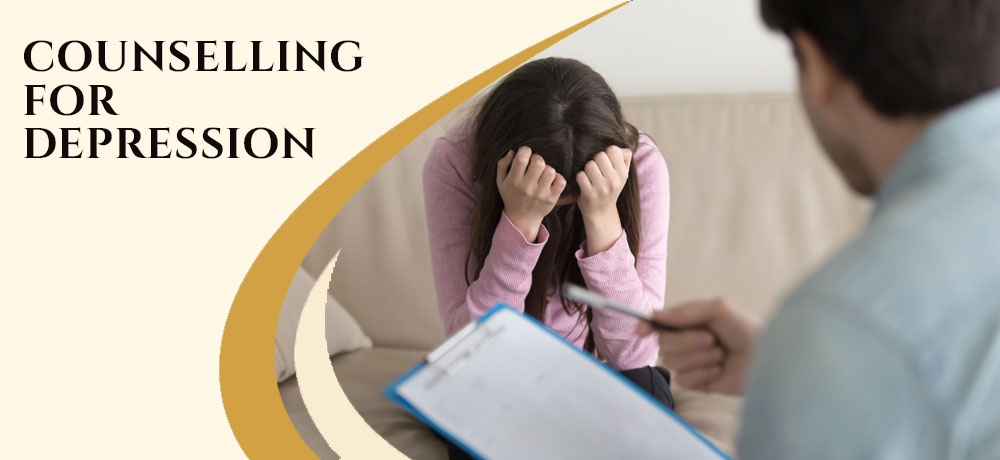Counselling For Depression

Are you struggling to overcome sadness, engage in activities that you once enjoyed, experiencing lower levels of energy and concentration, trouble sleeping and negative thinking? Please continue reading this article to learn more about what might be happening to you.
According to American Psychiatric Association (APA), Depression (major depressive disorder) is a common and serious medical illness that negatively affects how you feel, the way you think, and how you act. Fortunately, it is also treatable. Depression causes feelings of sadness and/or a loss of interest in activities you once enjoyed. It can lead to a variety of emotional and physical problems and can decrease your ability to function at work and at home.
Depression symptoms can vary from mild to severe and can include:
- Feeling sad or having a depressed mood
- Loss of interest or pleasure in activities once enjoyed
- Changes in appetite — weight loss or gain unrelated to dieting
- Trouble sleeping or sleeping too much
- Loss of energy or increased fatigue
- Increase in purposeless physical activity (e.g., inability to sit still, pacing, handwringing) or slowed movements or speech (these actions must be severe enough to be observable by others)
- Feeling worthless or guilty
- Difficulty thinking, concentrating or making decisions
- Thoughts of death or suicide
Symptoms must last at least two weeks and must represent a change in your previous level of functioning for a diagnosis of depression.
Depression affects an estimated one in 15 adults (6.7%) in any given year. And one in six people (16.6%) will experience depression at some time in their life. Depression can occur at any time, but on average, first appears during the late teens to mid-20s. Women are more likely than men to experience depression. Some studies show that one-third of women will experience a major depressive episode in their lifetime. There is a high degree of heritability (approximately 40%) when first-degree relatives (parents/children/siblings) have depression.
CAUSES OF DEPRESSION
Depression can occur due to a variety of reasons and especially due to factors that are not in control of an individual. Some of the commonly identified causes are:
- Genetic
- Social
- Trauma
- Life situations
- Chronic illnesses
- Biochemical
TYPES OF DEPRESSION
Once an individual identifies that their symptoms of depression are leading to major lifestyle changes and functioning levels, it is suggested strongly to reach out to a professional for support. Depending on symptoms, there are many types of depressive disorders as identified in DSM- V (Diagnostic and Statistical Manual of Mental Disorders- 5th edition). The diagnosis is important to have the right kind of treatment and support for the individual struggling to manage the symptoms.
- Major Depression
- Persistent Depressive Disorder
- Bipolar Disorder
- Seasonal Affective Disorder (SAD)
- Psychotic Depression
- Peripartum (Postpartum) Depression
- Premenstrual Dysphoric Disorder (PMDD)
- ‘Situational’ Depression
- Atypical Depression
- Treatment Resistant Depression
TREATMENT OF DEPRESSION
The first step in treating depression is to understand the depression. How is it impacting you and your functioning? Depression can be treated with medication and/or psychotherapy or counselling or both. Please read below to understand how psychotherapeutic approaches are evidently successful in treating the symptoms of depression.
PSYCHOTHERAPY & COUNSELLING FOR DEPRESSION
Psychotherapy have been proven to be the most effective treatment for depression. A psychotherapist diligently works with a client to understand their symptoms, causes and impact on their every day living. By co-constructing the goals in therapy, client and therapist work on identifying the maladaptive thinking patterns, unhealthy coping skills, and enhancing self-awareness and behavioral activation.
There are many evidence-based approaches that have been found useful in treatment of depression. Approaches like Cognitive Behavioral Therapy (CBT) help individuals identify their perception towards the problem or the situation and works toward replacing it with more realistic and evidence-based thought.
Our team at C2C Psychotherapy & Counselling are formally trained in CBT and other modalities like DBT, EMDR, Mindfulness based approaches, ACT to facilitate the management of symptoms of depression and anxiety. Our therapists also use the trauma informed context if they understand that client’s depression is a result of a traumatic event(s).
Please book your appointment to work with a therapist who can facilitate the process of healing and change.
